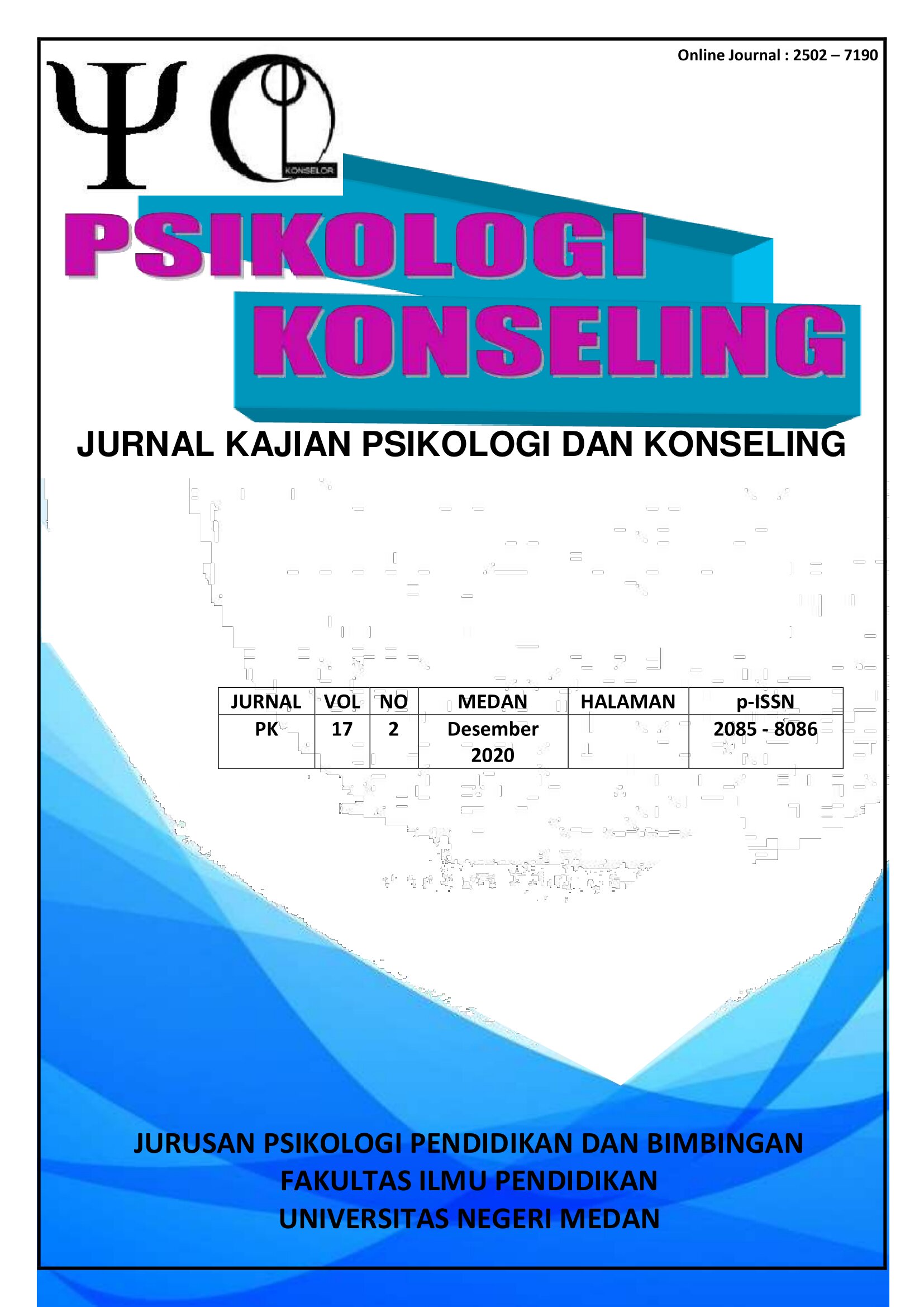TINGKAT PEMAHAMAN PESERTA DIDIK KELAS XI SMA SWASTA DI BEKASI TERHADAP EFIKASI DIRI DALAM BERPRESTASI
DOI:
https://doi.org/10.24114/konseling.v17i2.22109Keywords:
Level of Understanding, Self-Efficacy, AchievementAbstract
Each school has criteria or benchmarks used to determine the final results of the learning process that has been carried out. Student learning achievement is one input or output from the school. So great is the effect of learning achievement on schools and the environment that students need to develop themselves in achieving achievement. Students are expected to have motivation in learning and improve achievement for the advancement of themselves and their environment. Self-efficacy has a role in giving a confidence or confidence to students in carrying out the task and obtain the expected results. Confidence and confidence need to be instilled in students in order to develop their abilities and be responsible for the tasks assigned to them, and obtain results according to ability. This research, reveals a description of students' understanding in carrying out learning / academic assignments so as to prepare for the future and achieve the expected goals. The number of research subjects amounted to 162 people, as students of class XI Bekasi City Private High School. The results showed 98.8% of 162 students realized that success or success could be achieved with diligent effort, 95.7% of students tried to obtain achievements to achieve their goals, 98.8% of students tried to make the assignment given by the teacher can be completed on time, 85.8% of students have the confidence to complete the task and face difficulties in completing the task (80.2%). The level of self-understanding of Class XI High School Bekasi Private School students mostly acknowledges that success or success can be achieved with diligent effort, obtaining achievements that support the achievement of ideals, as well as having confidence in completing tasks while facing difficultiesReferences
Adicondro, Nobelina & Alfi Purnamasari. 2011. Efikasi Diri, Dukungan Sosial Kelompok, dan Self Regulated Learning pada Siswa Kelas VIII. Vol. VIII, No.1, Januari. Universitas Ahmad Dahlan: Humanitas.
Chariri, Anis. 2009. Landasan Filsafat dan Metode Penelitian Kualitatif. Undip: Discussion Paper (unpublished).
Desmita. 2016. Psikologi Perkembangan Peserta Didik. Bandung: Remaja Rosdakarya.
Gunarsa, Yulia S.D. dan Singgih, D. Gunarsa. 2017. Psikologi Remaja. Jakarta: Libri.
Gunawan, Imam & Anggraini Retno. 2012. Taksonomi Bloom: Revisi Ranah Kognitif Kerangka Landasan Untuk Pembelajaran, Pengajaran, dan Penilaian. Jurnal Pendidikan Dasar dan Pembelajaran.
Harahap, Dakkal. 2002. Analisis Hubungan Antara Efikasi Diri Siswa dengan Hasil Belajar Kimianya. Digital Repository. Universitas Negeri Medan.
Kurniyawati, Rita. 2012. Hubungan antara Efikasi Diri dengan Motivasi Belajar Siswa. Skripsi: Univeritas Muhammadiyah Surakarta.
Lodjo, Fernando Stefanus. 2013. Pengaruh Pelatihan, Pemberdayaan dan Efikasi Diri terhadap Kepuasan Kerja. Vol. 1. No.3. Jurnal EMBA: Jurnal Riset Ekonomi, Manajemen, Bisnis, dan Akuntansi.
Mellyta, Uliyandari. 2014. Analisis Tingkat Pemahaman Siswa Kelas XII IPA SMA Negeri Kota Bengkulu Untuk Mata Pelajaran Kimia. Program Studi Kimia, FMIPA, Universitas Bengkulu. Skripsi.
Mulyani, Dessy. 2013. Hubungan Kesiapan Belajar Siswa Dengan Prestasi Belajar. Jurnal Bimbingan dan Konseling : Konselor.
Nursito, Sarwono & ASN Jati. 2013. Analisis Pengaruh Interaksi Pengetahuan Kewirausahaan dan Efikasi Diri terhadap Intensi Kewirausahaan. Vol.5, No.3. Jurnal Unwidha: Kiat Bisnis.
Putra, Sofwan Adi, dkk. 2013. Efektivitas Layanan Bimbingan Kelompok dalam Meningkatkan Self Efficacy Siswa. Vol. 2, No.2 Juni. Jurnal Ilmiah Konseling: KONSELOR.
Rahma, Ayu Nuzulia. 2011. Hubungan Efikasi Diri dan Dukungan Sosial dengan Penyesuaian Diri Remaja di Panti Asuhan. Vol.8, No.2, Hal. 231-246. Jurnal Psikologi Islam.
Rustika, I Made. 2012. Efikasi Diri: Tinjauan Teori. Vol. 20. No. 1-2 (18-25). Fakultas Psikologi UGM: Buletin Psikologi.
Vandini, Intan. 2015. Peran Kepercayaan Diri Terhadap Prestasi Belajar Matematika Siswa. Jurnal Formatif.
Wardiati, Winda. 2017. Penerapan Pendekatan Konseling Kelompok Rational Emotive Perilaku (KREP) untuk Meningkatkan Efikasi Diri Siswa Kelas VII G di SMP Negeri 5 Pamekasan. Vol. 7, No. . Jurnal: BK Unesa.
Widyaninggar, Anggi Ajeng. 2014. Pengaruh Efikasi Diri dan Locus Kendali (locus of control) terhadap Prestasi Belajar Matematika. Vol. 4, No.2, Hal. 89-99. Jurnal Pendidikan MIPA: Formatif.
Zulkaida, Anita, dkk. 2007. Pengaruh Locus of Control dan Efikasi Diri terhadap Kematangan Karir Siswa SMA. Vol. 2. Proceeding: PESAT
Downloads
Published
How to Cite
Issue
Section
License
Copyright (c) 2020 Theodora Nurmalia, Dede Rahmat Hidayat

This work is licensed under a Creative Commons Attribution-ShareAlike 4.0 International License.
This work is licensed under a Creative Commons Attribution-ShareAlike 4.0 International License.




